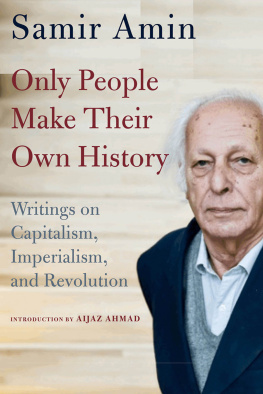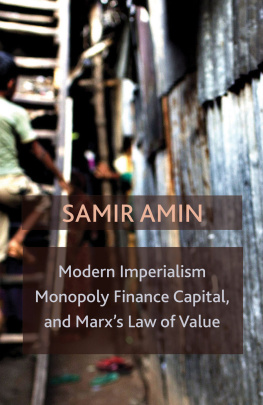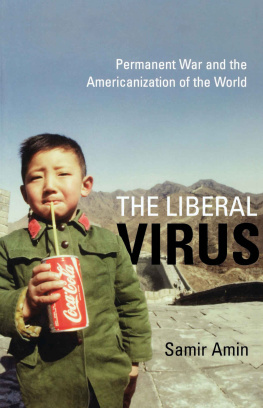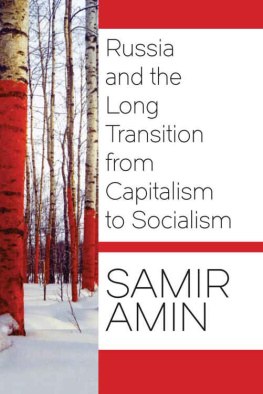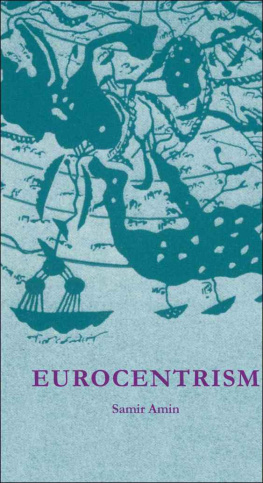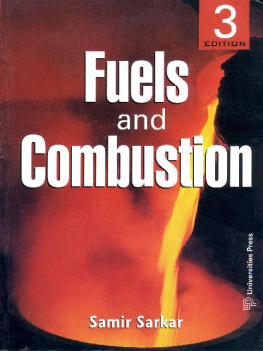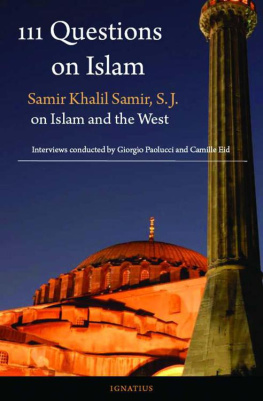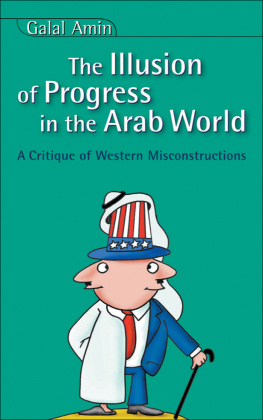Samir Amin - Only People Make Their Own History
Here you can read online Samir Amin - Only People Make Their Own History full text of the book (entire story) in english for free. Download pdf and epub, get meaning, cover and reviews about this ebook. City: New York, year: 2019, publisher: New York University Press, genre: Politics. Description of the work, (preface) as well as reviews are available. Best literature library LitArk.com created for fans of good reading and offers a wide selection of genres:
Romance novel
Science fiction
Adventure
Detective
Science
History
Home and family
Prose
Art
Politics
Computer
Non-fiction
Religion
Business
Children
Humor
Choose a favorite category and find really read worthwhile books. Enjoy immersion in the world of imagination, feel the emotions of the characters or learn something new for yourself, make an fascinating discovery.
- Book:Only People Make Their Own History
- Author:
- Publisher:New York University Press
- Genre:
- Year:2019
- City:New York
- Rating:4 / 5
- Favourites:Add to favourites
- Your mark:
- 80
- 1
- 2
- 3
- 4
- 5
Only People Make Their Own History: summary, description and annotation
We offer to read an annotation, description, summary or preface (depends on what the author of the book "Only People Make Their Own History" wrote himself). If you haven't found the necessary information about the book — write in the comments, we will try to find it.
Only People Make Their Own History — read online for free the complete book (whole text) full work
Below is the text of the book, divided by pages. System saving the place of the last page read, allows you to conveniently read the book "Only People Make Their Own History" online for free, without having to search again every time where you left off. Put a bookmark, and you can go to the page where you finished reading at any time.
Font size:
Interval:
Bookmark:

Only People
Make
Their Own
History
SAMIR AMIN
Only People
Make
Their Own
History
Writings on Capitalism, Imperialism, and Revolution
Introduction by AIJAZ AHMAD

MONTHLY REVIEW PRESS
New York
Copyright 2019 by Estate of Samir Amin
English translations Monthly Review
Introduction Aijaz Ahmad, 2018
This volume Monthly Review Press, 2019
All Rights Reserved
Library of Congress Cataloging-in-Publication data available from the publisher.
ISBN paperback: 978-1-58367-769-8
ISBN cloth: 978-1-58367-770-4
First published in November 2018 by LeftWord Books, India
Monthly Review Press, New York
monthlyreview.org
5 4 3 2 1
CONTENTS
by Aijaz Ahmad
INTRODUCTION
Aijaz Ahmad
To be a Marxist is to continue the work that Marx merely began, even though that beginning was of unequalled power. It is not to stop at Marx, but to start from him Marx is boundless, because the radical critique that he initiates is itself boundless, always incomplete, and must always be the object of its own critique (Marxism as formulated at a particular moment has to undergo a Marxist critique.).
Samir Amin, The Law of Worldwide Value
Samir Amin (19312018) was one of the grand intellectuals of our time. A distinguished theoretician, his life of political activism spanned well over six decades. A socialist from an early age and trained as an economist, he insisted that laws of the economic science, including the law of value, were operationally subject to the laws of historical materialism. Trained also as a mathematician, he avoided too great a mathematization of his concepts and kept algebraic formulae to a minimum in even the most technical of his writings. The ambition always was to retain theoretical rigour while also communicating with the largest possible number of readersand activists in particularthrough exposition in relatively direct prose. His readership, like his own political activism, was spread across countries and continents.
Amin came of age in the 1950s, when the wave of socialist revolutions seemed to be very much on the ascendant and the old colonial empires were being dismantled across Asia and Africa. Communist parties and socialist movements had emerged in these continents, more in Asia than in Africa, even before the Second World War. Onset of the postwar period witnessed immense expansion of revolutionary activitythe Chinese revolution, Korea, the onset of revolutionary liberation movements in Indochina and so on. With the notable exception of China, however, most countries in these continents had produced relatively little original work in the field of Marxist theoretical knowledge. Study of any sort of Marxism largely meant explication and/or translation of texts produced elsewhere, and that too was confined to the very brief texts or extracts from the Marxist classics or exegeses done in Britain, France or the Soviet Union. This now began to change, in several notable ways. First, we witness the rise of a new generation of Marxist scholar-activists across Asia and Africa over the very years when the colonial empires were getting dismantled. Second, a number of these new intellectuals, often associated with communist parties or national liberation movements, bring into their work increasingly sophisticated knowledge of the more fundamental of the classics: the major works of Marx, Lenin, Luxemburg, Bukharin, Kautsky and others. Third, attention shifts to extended, rigorous analyses of (1) the historical development, modes of production and class structures not so much of Europe as of Asian and African countries, and (2) the very elaborate mechanisms involved in the exploitation of the imperialized countries, i.e., the process whereby values produced in the colonies were appropriated for accumulation in imperialist centres.
Mention of a few dates should clarify this. Thus, for example, Amin submitted his 629-page doctoral dissertation to the University of Paris in 1957 and published it much later as the two-volume Accumulation on a World Scale (French edition 1970; English translation 1974). In the course of roughly those same Theoretically, Amin was much closer to Paul Baran who published The Political Economy of Growth in 1957, the year Amin submitted his mammoth dissertation. The great classic of Marxist political economy that Baran co-authored with Sweezy, Monopoly Capital, followed soon thereafter, in 1966. Anatomies of imperialism had thus arrived at the very centre of new Marxist thinking across the world, and Marxism itself had become a powerful tool for independent thought and research across the Tricontinent. On both these counts, Amins dissertation would appear to be among the first texts re-fashioning the contours of postwar Marxism in a very particular way, as we shall argue below.
Amin was proficient in several languages but wrote primarily in French. He was a stunningly prolific writer, producing books and articles with great speed until death itself silenced that fertile mind. Not all his work is available in English. Some of the translations have appeared elsewhere but, on the whole, Monthly Review Press has been by far the most devoted publisher of his The objective here is to assemble a not too cumbersome a collection of his essays that would elucidate some of the most fundamental coordinates of Amins thought in the closing years of his life. The introduction here is designed not to explicate those texts but to situate them in the larger fabric of his life in which the personal, the political and the theoretical were meshed together in a tight weave.
I
Samir Amin published two books of reflections on his own life. In Re-Reading the Postwar Period, he offers his own reconstruction of his political views and theoretical positions as they evolved from one decade to the next, up to the beginning of the 1990s. We shall return to this presently.
Re-Reading the Postwar Period recounts the stages of his own intellectual development in relation to the main features and events of that period. The latter portions of the other memoir, A Life Looking Forward, reconstruct that same politico-intellectual itinerary in more personal terms but it is in the earlier sections of the book that we get a vivid narrative of his growing up in a rather unique family and his early orientation toward revolutionary politics, so that all of his life, beginning to end, seems to cohere into an integral whole.
The fathers side was Coptic upper class, part of a cosmopolitan mini-world of Christian and Muslim Egyptians, Greeks, Armenians, Maltese as well as French and British migr residents sprinkled all over Cairo but spread more widely over Alexandria, Port Said and more generally across the region where the fertile Nile delta of Lower Egypt meets the countrys Mediterranean coast. The family, which included well-known publishers and writers of the 19th century, was part of a larger milieu that valued secular democratic convictions, higher learning, professional standing, and a sort of liberal bourgeois enlightenment that looked down on all sorts of feudalism and conservatism. His father, a doctor by profession and a bourgeois with social conscience, was opposed both to British colonialism and to monarchy, and he preferred communists to demagogic nationalists, including Nasser. On the other side of the family, Amin quotes his maternal grandfather, a freemason and a socialist, as once explaining to him, we Alsatians helped to make the [French] Revolution and we know the meaning and price of liberty. As for the maternal grandmother, she, born soon after the Paris Commune in 1874 was one of the descendants of the French revolutionary Jean-Baptiste Drouet, who played a role in the arrest of Louis XVI at Varennes in 1791 My grandmother was quite proud of this ancestor, who was also active in the Babeuf movement. As for my grandmothers name, Zelie, this was quite fashionable in the 19th century, but she told me she had been given it in homage to the Communard Zelie Camelinat. This grandmother disliked religion and preferred to revive the Enlightenment slogan No God, no masters, which 19th century Anarchists like Bakunin shared at the time with Marx.
Next pageFont size:
Interval:
Bookmark:
Similar books «Only People Make Their Own History»
Look at similar books to Only People Make Their Own History. We have selected literature similar in name and meaning in the hope of providing readers with more options to find new, interesting, not yet read works.
Discussion, reviews of the book Only People Make Their Own History and just readers' own opinions. Leave your comments, write what you think about the work, its meaning or the main characters. Specify what exactly you liked and what you didn't like, and why you think so.

